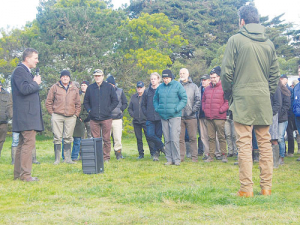Three new grower directors appointed to FAR board
Effective from 1 January 2026, there will be three new grower directors on the board of the Foundation for Arable Research (FAR).
 Foundation for Arable Research chairman David Birkett addresses attendees on a field trip to Lake Ellesmere during FAR’s Growing Sustainable Futures Conference at Lincoln University.
Foundation for Arable Research chairman David Birkett addresses attendees on a field trip to Lake Ellesmere during FAR’s Growing Sustainable Futures Conference at Lincoln University.
Big changes are coming in world food supply, says Foundation for Arable Research (FAR) chairman David Birkett.
With growing interest in synthetic foods replacing traditional protein sources, the arable industry is well-placed because most of the opportunities are plant-based material, he said.
“Plant-based material [is good in respect of] environmental losses and I think that’s where a lot of the drive will come from – the public’s demand for sustainable and efficient food production.
“The question for us is how does the New Zealand arable farmer fit into that, because a lot of the production will come from the big commodity growers around the world. We can’t compete with them so we’ve got to find the point of difference NZ has in that area.”
FAR recently held its two-day national conference at Lincoln University, on the theme ‘Growing Sustainable Futures’.
Birkett said that over its 20-year history FAR had moved as an organisation from its beginnings concerned with simple crop agronomy.
About five years ago it had started to look at the whole farm system, rotations and how they interlinked. Looking at that big picture had brought big gains, he said, and the strategy for the next few years would be to look wider still.
“We’re now starting to shift to the next area of the whole farm business, because there are components outside the farmgate that are having a big influence on how we operate. We need to integrate those issues into the farming business and address them.”
Opening the conference, Birkett said FAR’s front-footing of the issues would put arable farmers in a position to answer questions asked of them and have the proof at hand.
The issues facing the industry have become far broader, he says.
“As we’ve seen over the last 10 years, climate seems to be changing whether you believe in climate change or not. The fact is the distribution of rainfall is changing.
“We need to understand what those changes mean, how we manage them and whether those changes give us opportunity – perhaps new crops that may be grown in areas where they previously weren’t. And how do we maximise those crops to get the most out of them?
“Markets are changing as well. We’ve got to understand the demands of the markets we’re selling into.
“If we don’t we’re not going to hit those markets correctly.
“There’s a lot of talk now about proteins replacing meat and milk in the marketplace. What is our role there?”
Birkett said protein replacement is a “really interesting” development because of arable farming’s environmental footprint.
“It’s important that we try to understand what those advantages are and that we front-foot wherever we can. Our international collaborations allow us to do that, and through FAR Australia we are able to get access to research we would never get done here because of the scale of our industry.”
He predicted further gains from agronomy improvements of 1-2% but 5-10% gains from market opportunities.
Birkett, a Leeston cropping farmer with a recent but unofficial world record wheat yield to his name, also addressed conference goers during a field trip to the nearby shore of Lake Ellesmere/Te Waihora.
He recommended farmers form community groups to deal with issues in their areas, explaining how he and his neighbours formed a group to liaise with ECan.
Among other achievements, their lobbying had helped simplify Ecan’s environmental compliance paperwork.
Meanwhile, the country’s 2500 arable farmers were being urged to vote ‘yes’ in the upcoming referendum to confirm FAR’s mandate to levy its members for the next few years.
Birkett expected the referendum to pass but said it wasn’t just a rubber stamp. "lt's always good to check the pulse.”
New Zealand's new Special Agricultural Trade Envoy, Horowhenua dairy farmer, company director and former Minister of Agriculture, Nathan Guy says the Free Trade Agreement (FTA) with India is a good deal for the country.
New figures show dairy farmers are not only holding on to their international workforce, but are also supporting those staff to step into higher-skilled roles on farm.
New tractor deliveries for 2025 jumped 10% compared to the previous year, a reflection of the positive primary sector outlook, according to the Tractor and Machinery Association (TAMA).
Entries have opened for two awards in the New Zealand Dairy Industry Awards (NZDIA) programme, aimed at helping young farmers progress to farm ownership.
Federated Farmers has confirmed interim chief executive Mike Siermans to the role.
Registrations are now open for the 2026 Ruralco Golf Classic, with all proceeds from the event set to support the Mid Canterbury Rural Support Trust.

OPINION: If the hand-wringing, cravat and bow-tie wearing commentariat of a left-leaning persuasion had any influence on global markets, we'd…
OPINION: With Winston Peters playing politics with the PM's Indian FTA, all eyes will be on Labour who have the…